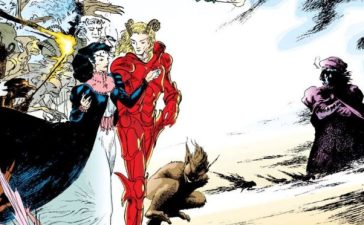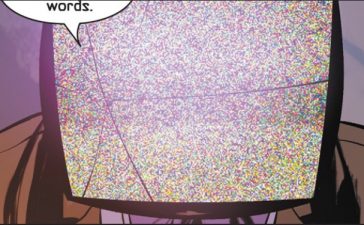With the political climate heating up in the US, and Marvel’s Captain America: Civil War premiering this week, we put together a list of our ten favorite comics dealing with political issues…
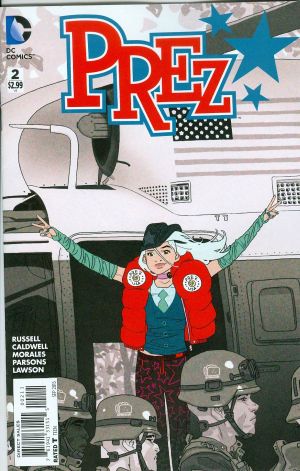
#10. Prez
Published by DC Comics, the Prez series is a sci-fi satire set in the year 2036. The creative team – writer Mark Russell and artists Ben Caldwell, Dominike Stanton, Mark Morales, Sean Parsons, John Lucas, and Jeremy Lawson – depicts a future America where corporations and social media are out of control, politicians debase themselves on moronic media outlets, citizens (including kids) can vote for president using Twitter, and an unassuming teenager named Beth Ross becomes an accidental Internet celebrity and successful candidate for U.S. president. Inspired by an earlier 1973 Prez series created by writer Joe Simon and artist Jerry Grandenetti, the current series satirizes America’s modern political culture, where corporations have more influence than people and the public apparently can’t be bothered to pay serious attention to distant wars or local economic injustice.
Some politically conservative readers might feel uncomfortable with the creative team’s choice of targets; although both conservative and liberal politicians are depicted in an unflattering manner, it could be argued that conservative stereotypes take the brunt of the satire. Such readers will hopefully be charmed by the engaging story and characters, and consider the old saying, “If the shoe fits, wear it.”
While the series offers much humor and occasional action, the heart of the series is President Beth Ross – an everyday teenage political outsider with more compassion and courage than the professional political class that surrounds her. The comic has a lot to say about America’s politics, and Prez is arguably the comics series most relevant to current political concerns-Reed
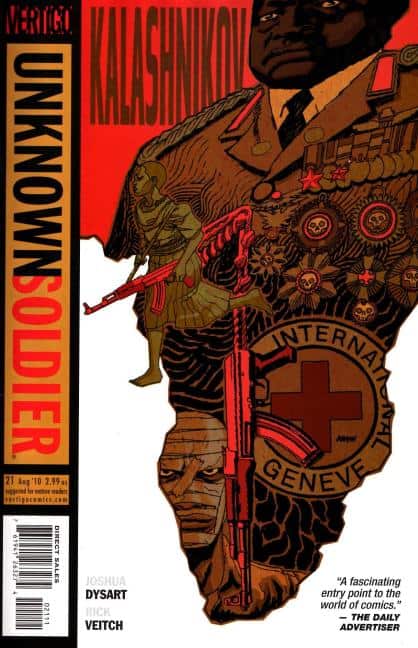
#9. Unknown Soldier
Taking up the prestigious Vertigo tradition of revitalizing C-grade characters, Joshua Dysart reinvented the Unknown Soldier for a new era. Dr Moses Lwanga returned to his native Uganda believing that his medical skills and pacifist ideals could assist in healing his war-torn land. Instead he is plunged into the violent chaos of civil war. As he sinks deeper into a conflict full of fanaticism, child soldiers and First World meddling, Dr. Lwanga is forced to confront whether any of his ideals have any truth to them or if sometimes the only possible response to violence is more violence. Dysart delves deep into morally complicated territory while denying the reader any easy answers. At the same time, amidst all the bloodshed, Dysart is still able to find beauty in the world. Taken together, Dysart and Alberto Ponticelli (the series’ primary artist) draft a unforgettable journey-Creighton
#8. Transmetropolitan
“Journalism is just a gun. It’s only got one bullet in it, but if you aim right, that’s all you need. Aim it right, and you can blow a kneecap off the world.”
That quote from the conclusion of Transmetropolitan’s opening arc is probably one of the best and most affecting lines of comics dialouge of the last twenty years. Warren Ellis & Darick Robertson Transmetropolitan is a cynical futurist look at western civilization and our broken political systems but it’s also about how anybody can fight that with truth. It’s politics are partially meant to tear down existing power structures but also to empower the individual that they overwhelm-Pat
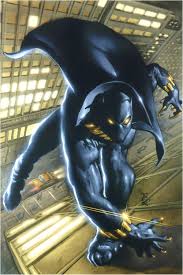
#7. Black Panther by Christopher Priest
“The client leaped out an open window leaving me, Everett K Ross, Emperor of useless white-boys to fend for himself among the indigenous tribes of the Leslie N. Hill Housing projects
Zuri was in his third retelling of how the great god T’Chaka ran the evil white devils out of their ancient homeland
The bathroom has no door
I still have no pants”
The opening text to Christopher Priest’s extended run on Black Panther tells you everything you need to know about what it is, that being a straight up political satire, a political satire that is mostly based around race and possibly the best comic ever at doing so. Having a black writer using a white character as a narrator for a story about a black character is absolutely fucking brilliant in it’s multi-layered subversiveness and Priest used that to it’s full potential for some of the funniest and most insightful political comedy this side of Colbert & Stewart
For example:
“US law often annoyed the client (Black Panther) who came from a land where wrong is wrong and justice was chasing a shoe salesman 80 miles across a desert.
This was the land of OJ and JonBennet. A Universe of plea bargains and talking points”
“Now you’ve got your ear to the men’s room stall waiting for Trent Lott’s flush to tell you which way the salmon are swimming”
There are novelist that would murder their children to write something that sharp so effortlessly and Priest was doing so in a Black Panther comic of all places. Chronically unappreciated in it’s time and afterwards, Preist was so far ahead of his time in comics that the rest of the industry is just starting to catch up to him in titles like Prez or Sam Wilson Captain America. Even there, what Priest was able to do on Black Panther is still light years ahead and until mainstream comics really let’s African American creators tell their stories, it will probably stay that way for good or ill-Pat
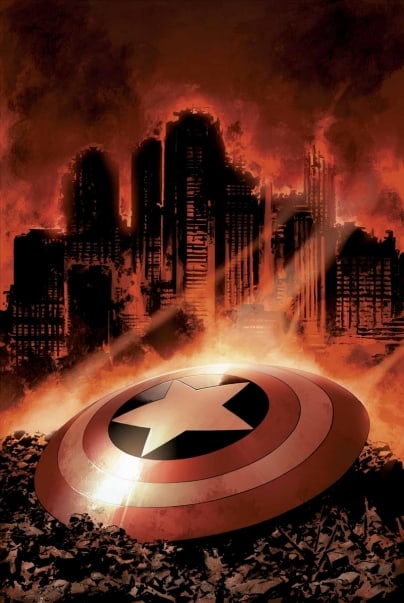
#6. Captain America by Ed Brubaker
While owing much of it’s aesthetic to noir and classic spy fiction, Brubaker’s run on Captain America was also making a profound statement about new deal politics in a post 9/11 world of privatization and an out of control military industrial complex. Brubaker’s exploration of these themes is incredibly subtle but also multifaceted. Sharply insightful, dramatically tragic but ultimately hopeful, Brubaker’s Captain America is the definitive post 9/11 superhero comic-Pat
#5. Persepolis
There is an old adage that all politics are personal. That is definitely the case with Persepolis, Marjane Satrapi’s memoir about coming of age in the Islamic Republic of Iran. Satrapi does an excellent job of placing her country’s story in context, along with her family’s place in it. At the center, though, is Satrapi’s own struggles both with adolescence and the hurdles of society. As she grows older, she wrestles with how much loyalty she owes her country or whether she should abandon her homeland for Europe. As heady as these ideas are, Satrapi never allows the material to turn dry, keeping the reader thoroughly engaged throughout. Much credit for this goes to her stunningly expressionistic art which conveys both the innocence of a child’s fantasy and the searing terror of repression. At turns absurdly satirical and heartrendingly sad, Persepolis tells one woman’s specific narrative while also conveying what is universal about it. In the process, Satrapi illustrates just how diverse and nuanced Iranian society is-Creighton
#4. Howard the Duck
Steve Gerber possessed one of the most unique voices in comics and Howard the Duck was his masterpiece. At first glance the satire simply poked fun at current cultural trends (kung-fu, Star Wars) while on closer reading it was a pointed critique of a country in love with violent entertainment and at the mercy of corporate domination. Gerber’s targets were wide and varied, especially once Howard threw his hat into the Presidential election ring, running on the All-Night Party ticket. Gerber was also not afraid to take on prominent figures of the culture wars, literally villainizing one in a way that would never get past editorial these days. Most important, though, Gerber’s satire was not simply smart, but entertaining as well. These comics are a lot of fun and have barely aged in the last 40 years. Gerber’s Howard the Duck was not simply ahead of its time for 1976, it remains radical for 2016. If there is a gold standard for social satire in this medium, it is Steve Gerber’s Howard the Duck-Creighton
#3.Watchmen
Everyone who knows comics should know about Watchmen by now. Its the seminal work in the field and for good reason. Alan Moore took the Superhero and fractured him in gut-wrenching multidimensional humanity. At the same time, he shows what would happen to the World if a real life Superman existed. Much like the Atom Bomb, it’s gamechanging. Watchmen examines every level of American society (in Moore’s eyes), from lowly New Yorkers looking for love, acceptance, or purpose, to the Watchmen themselves and how little prepared they are for what the future is bringing as the clock counts down. Conservatism, Richard Nixon, Nuclear Deterrents and the Vietnam War are just a handful of subjects discussed in the book, and it is all done masterfully-Josh
#2. Green Lantern/Green Arrow:
After the Swinging Sixties, America found itself in a turbulent place in history. The World had gotten more complex and no one, not even the Guardians of the Universe, seemed to have the answers. Green Lantern, exposed to an evil that had escaped his sight, finds himself brought to Earth by Green Arrow. Reimagined by Denny O’Neil as an angry Communist fighting for the Common Man, Green Arrow represented the writer’s own anger at the state of things. The Establishment met the Voice of the People, represented by the authority of the Green Lantern Corps and a millionaire who found himself humbled by the harsh realities of life. As the two begin a road trip to find America (yes really), they encounter issues such as Ecological protests, Racism, dwindling resources and drug use poisoning America’s youth. The fact that these are issues as relevant today as they were almost 50 years ago should say something-Josh
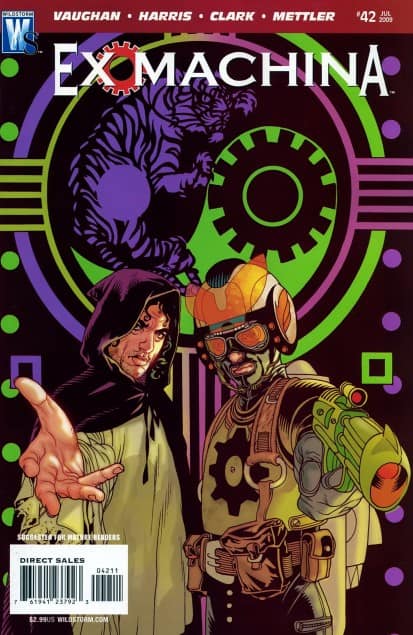
#1. Ex Machina
The superhero series Ex Machina features protagonist Mitchell Hundred, who gains the power to control machines after encountering an alien device. Hundred uses his powers to become the world’s first and only superhero, The Great Machine, but later gives up his superhero career to have a bigger impact on society — he publicly reveals his secret identity and successfully campaigns to become the mayor of New York City. In Ex Machina, writer Brian K. Vaughan and artist Tony Harris tackle topics such as gay rights, freedom of speech, and the injustice of draconian marijuana laws; it even explores the local issue of whether car alarms should be banned in New York City! These explorations of political issues are always balanced, with characters offering different points of view that challenge the reader to think about the issue. But Ex Machina isn’t just a comics dialectic; Hundred and his allies also have to deal with physical dangers related to his superhero past and origin, and the series has plenty of action amid the politics.







